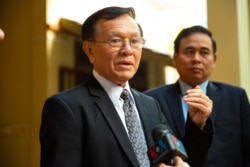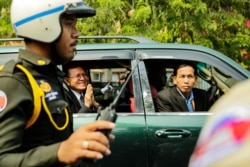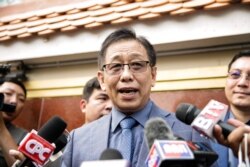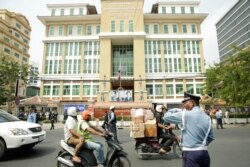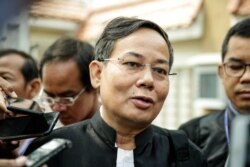The Phnom Penh Municipal Court prematurely ended Thursday’s hearing into Kem Sokha’s treason trial, to allow for the defense to consolidate all the documents and evidence it planned to present before the court.
The court resumed the hearing Thursday morning, with the proceedings also discussing Kem Sokha’s activities from 1993 to 2007. The panel of three judges asked the defense to submit all the evidence they wanted to present to the court in one package by January 20. They then suspended the proceedings till next week, said Pheng Heng, one of Kem Sokha’s lawyers.
The court did spend a large section of Wednesday’s hearing to deliberate over the defense’s request to present its evidence, specifically a more than a two-hour discussion on whether to play the entire “treason” video clip from 2013.
Pheng Heng added that the case file given to the defense contained a few pieces of evidence, such as photos and some documents, but that the government lawyers were presenting evidence in court that had not been made available to the defense.
Meng Sopheary, another lawyer for Kem Sokha, said that the court would probably show a 1-hour segment of the “treason” video on January 22. But, she said, the video, which was the basis for the charge, could not be used to prove an attempted revolution because there were no “actual” activities to support the claim.
“It can’t be an offense if someone just said something,” she said, adding that the video had been clearly spliced to alter its meaning.
She also questioned the government’s contention that the alleged crime started in 1993, asking for specifics from the government lawyers to illustrate the treason plot.
“If my client committed the offense in 1993 - what time did he do it? When? And with whom?” she said. “Is there any evidence from then?”
Government lawyer Ky Tech said his team continued to question Kem Sokha about his work, but did not provide any specifics. He also said that his suggestion for coding the names of countries, organizations, and individuals did not mean they were directly involved in the crime.
He said for example if an NGO was linked to the case then the country they originated from would have to be mentioned, but again that did not mean the country was part of the treason plot.
“It does not mean those countries I mentioned are related to the offense in the case,” he said, speaking to reporters after the hearing.
The experienced lawyer also reined in comments he made to a VOA Khmer reporter on Wednesday, when asked why was Taiwan referred to as a “state” in court by government lawyers.
Ky Tech on Wednesday asked the journalist not to ask “challenging” questions and to “please be careful.”
On Thursday, the government lawyer seemed to soften his tone and acknowledged his “angry behavior” the previous day. But he said the reference to Taiwan as “state E” was only for representative purposes and not a comment on recognition of Taiwan as a state.
Cambodia has strictly adhered to and supported the “One China” policy, which asserts that there is only one sovereign state under the name China and that Taiwan is an “inalienable” part of the mainland.
“On another note, yesterday after reflecting myself, I seemed to express an outraged gesture when I was asked by a brother that, by mentioning Taiwan, he said or he wanted to accuse that we recognized [Taiwan] as a state. It is not like that,” Ky Tech said.
The court administration has come under heavy criticism in the past few days for not allowing independent journalists and human rights NGOs to monitor the case in court. They have said embassy officials and other politicians have been given priority to witness the proceedings, even though media reports suggest that there were vacant seats in the courtroom.
Civil society groups and journalism organizations released a joint statement Thursday morning, criticizing the court’s decision to prevent independent journalists and NGOs from getting passes to enter the court. The organizations include grassroots communities, human rights NGOs and media organizations.
The groups said the decision to prevent independent observers in the courtroom, despite there being empty seats, showed that the “true motive” was to “deny access to journalists and independent civil society groups, as well as the families of the accused.”
“If the room is limited, the court should broadcast the trial proceedings live – it’s the digital age,” said May Titthara, head of journalism alliance CamboJA, in the statement. “To restore a better space for media, the court should change their mindset.”
Journalists have so far relied on short comments from government and defense lawyers when the court is in recess, but have lacked a lot of critical details about the two days of hearings.
The defense had requested the court to accommodate journalists in the trial by at least screening the proceedings, said defense lawyer Pheng Heng.
Niem Chheng, a reporter with the Phnom Penh Post, said it was hard to publish a “good story” with information relayed by lawyers and it was preferable for journalists to themselves document the proceedings.
“During the next hearing, I request the court to allow at least one journalist from each institution to attend the trial,” he said.





